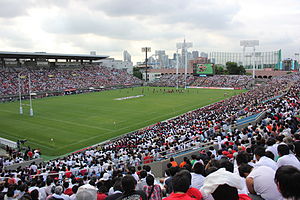sport.wikisort.org - Stadium
Chichibunomiya Rugby Stadium (秩父宮ラグビー場, Chichibunomiya Ragubī-jō) (also called Prince Chichibu Memorial Stadium) is a rugby union stadium located in the Aoyama district of central Tokyo, Japan. It is the spiritual home of Japanese rugby union and the headquarters of the Japan Rugby Football Union. Named for Prince Chichibu, the late brother of Emperor Hirohito, the venue is used mostly for rugby sevens and rugby union matches.
 | |
 | |
| Former names | Tokyo Rugby Stadium (1947–1953) |
|---|---|
| Location | |
| Coordinates | 35°40′21.37″N 139°43′5.41″E |
| Owner | Japan Sport Council |
| Operator | Japan Sport Council |
| Capacity | 27,188 |
| Surface | Grass |
| Construction | |
| Opened | 1947 |
| Renovated | 1973, 2003 |
| Tenants | |
| NTT Communications Shining Arcs Tokyo Sungoliath Sunwolves (2015-2020) | |
Redevelopment plans call for the stadium and the adjacent Meiji Jingu Stadium, used for baseball, to be demolished and replaced with new facilities.
Facilities
The stadium currently can accommodate 27,188 spectators, but only part of the stands are covered. A large electronic scoreboard was added to the grounds as a step toward modernization before the fifth Rugby World Cup in 2003.
On April 19, 2007, it was announced that the stadium was to be equipped with lights for night games by the end of July, to assist with the RWC 2015 bid. The first rugby game under lights was Japan v Asian Barbarians in August 2007, the send-off for Japan going to RWC 2007. Since then it has been used for the first Top League game of the 2007–8 season between Suntory Sungoliath and Toshiba Brave Lupus, also played under lights and won 10–3 by the former on October 26, 2008.
History
Originally completed in 1947, it was at first called Tokyo Rugby Stadium. In 1953 the name was changed to Chichibunomiya Rugby Stadium. The stadium also served as a venue for football matches in the 1964 Summer Olympics.
The name Chichibunomiya commemorates the sporting prince, Prince Chichibu, who was not a rugby union player but was passionately fond of the sport and died in 1953. A statue of the prince in a rugby uniform was erected at the stadium.
On February 3, 2008, snow prevented two Top League games being played in the 13th and final round of the fifth season. They were postponed to February 9.
From 2012 through 2015, the stadium hosted the Japan Sevens, a newly created event on the circuit for men's national rugby sevens teams now known as the World Rugby Sevens Series. When inaugurated, the tournament was the seventh on the circuit schedule, and was held in late March/early April.[1] After the 2014–15 series, Japan was removed from the schedule in favor of a return to former series host Singapore.
From 2016, it has been used as the home ground for the Sunwolves Super Rugby team, along with Singapore National Stadium.
In 2019, the Meiji Jingu Gaien, the Japan Sports Council, Mitsui Fudosan and Itochu Corp. groups agreed to redevelop both Meiji Jingu Stadium and the Chichibunomiya Rugby Stadium. Under the plans, Meiji Jingu Stadium will be demolished and rebuilt on the site of the rugby ground.[2] The replacement rugby stadium will be built on the current site of the Meiji Jingu Stadium Number 2 field. Officials have announced that the new stadium will have a roof over the field and stands.[3]
See also
- Kintetsu Hanazono Rugby Stadium
- Japan national rugby union team
- Sunwolves Super Rugby Team
- Top League
References
- "Japan joins expanded HSBC Sevens World Series" (Press release). International Rugby Board. 18 August 2011. Archived from the original on 27 September 2011. Retrieved 29 August 2011.
{{cite press release}}: CS1 maint: unfit URL (link) - "Olympics: Tokyo's iconic baseball, rugby fields set for redevelopment". Kyodo News. 28 February 2019. Retrieved 8 May 2020.
- "Officials choose dome for new Prince Chichibu rugby stadium". The Asahi Shimbun. 25 December 2020. Retrieved 18 May 2021.
- 1964 Summer Olympics official report. Archived 2010-07-07 at the Wayback Machine Volume 1. Part 1. p. 120.
- 秩父宮ラグビー場, National Agency for the Advancement of Sports and Health
External links
| Wikimedia Commons has media related to Chichibunomiya Rugby Stadium. |
На других языках
[de] Prinz-Chichibu-Rugbystadion
Das Prinz-Chichibu-Rugbystadion (jap. 秩父宮ラグビー場, Chichibu no miya ragubī-jō) ist ein Rugbystadion für rund 25.000 Zuschauer in Kita-Aoyama, Minato in der japanischen Präfektur Tokio. Es ist Austragungsort der ab 2011 wieder ausgetragenen Japan Sevens, außerdem wird es für Spiele der Top League genutzt. Benannt ist es nach Generalmajor des Heeres Prinz Chichibu Yasuhito, in der Nachkriegszeit ein Förderer des Rugby. Eigentümer und Betreiber des Stadions ist das Nihon Sports Shinkō Center.- [en] Chichibunomiya Rugby Stadium
[fr] Chichibunomiya Rugby Stadium
Le Chichibunomiya Rugby Stadium (秩父宮ラグビー場, Chichibunomiya Ragubī-jō?), également appelé Prince Chichibu Memorial Stadium, est un stade situé à Aoyama, un quartier au centre de Tokyo, capitale du Japon principalement consacré au rugby à XV et quartier général de la Japan Rugby Football Union.[ru] Титибуномия
Регбийный стадион Титибуномия (яп. 秩父宮ラグビー場 Титибуномия рагуби:-дзё:), также известный как Стадион имени принца Титибу — регбийный стадион, находящийся в токийском округе Аояма, в центре развития регби Японии, рядом со штаб-квартирой Японского регбийного союза. Получил имя в честь японского принца Титибу, более известного как Ясухито, брата императора Хирохито. Стадион используется для проведения матчей по классическому регби и регби-7. Планируется его снос в рамках подготовки к летней Олимпиаде 2020 года, на месте стадиона будет парковка.[1].Другой контент может иметь иную лицензию. Перед использованием материалов сайта WikiSort.org внимательно изучите правила лицензирования конкретных элементов наполнения сайта.
WikiSort.org - проект по пересортировке и дополнению контента Википедии
